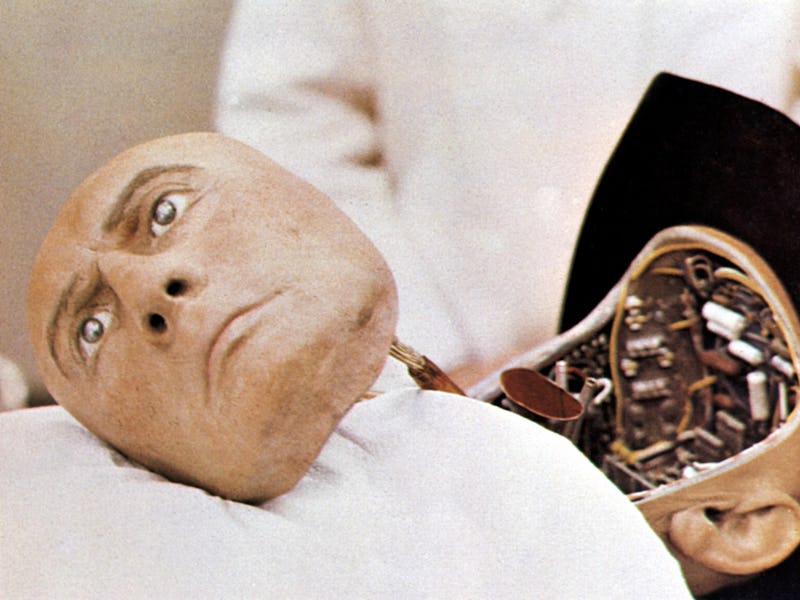You Need to Watch the Most Influential Sci-Fi Movie on HBO Max ASAP
Almost 50 years later, this Michael Crichton classic is more relevant than ever.

Will robots become smarter than us? Will they try to take over the world? Should we start treating robot rights just as we treat human rights? Questions that once were once relegated to science fiction have become commonplace thanks to the rise of ChatGPT and other technology.
But before AI was even a twinkle in Sam Altman’s eye, one sci-fi legend unleashed a story about the powers and risks of the technology that still resonates today — thanks in part to an excellent HBO adaptation that ran from 2016 to 2022. We’re talking, of course, about Michael Crichton’s 1973 Westworld, which is streaming on HBO Max until the end of April. Here’s why you need to watch this 50-year-old movie today, and what you should know before you grab the popcorn.
Westworld was written and directed by Crichton, best known for penning books the Jurassic Park books that inspired the movies. But with Westworld, he chose to skip the novel and jump straight to the screenplay, saying that the story was too visual to work as a book.
Crichton was true to his word and used the movie to push the limits of filmmaking. This is the first film to represent a robot’s point of view using digitized images — a technique that would inspire countless other sci-fi stories.
The robot’s POV in Westworld.
You’re probably familiar with the basic plot — robots run amock at a futuristic Wild West theme park — but it’s worth revisiting the finer details. Set 10 years in the future — in 1983 — the film opens with a cheery TV advertisement for Delos, an amusement park which consists of three themed worlds: Western World, Roman World, and Medieval World. It is, the ad proclaims, "the vacation of the future, today!"
The futuristic park offers a fully immersive experience. Guests pay $1,000 a day to dress up and interact with the lifelike robots. They can talk with them, befriend them, and buy from them. They can also sleep with them and murder them. Guests are protected from any harm by a few programming tricks and a team of computer engineers watching over the park from an underground control room.
For most of the film, we stick with John (James Brolin) and Pete (Richard Benjamin), two friends visiting Western World. Pete is initially hesitant, complaining about the humble saloon inn and the strong shots of whiskey available at the bar. But after murdering the Gunslinger (Yul Brynner), a gruff, trigger-happy robot, he seems to relish in the freedom and consequence-free depravity the park offers.
Yul Brynner points his weapon at James Brolin.
What begins as a shoot-'em-up romp through the Wild West takes a dark turn when the scientists lose control of the robots and Pete finds himself in a very real game of cat and mouse with the chilling, Terminator-like Gunslinger.
As the original source material for HBO's Westworld, this film holds up in many ways. It raises many of the philosophical questions about artificial intelligence that are now more relevant than ever. However, the 1973 film lacks some of the moral and philosophical nuances of the more recent series.
HBO’s adaptation plundered the space between humanity’s capacity for thoughtless destruction and AI’s capacity for emotion. But the original film avoids this debate altogether. Westworld (the movie) can’t seem to accept that its heroes might be just as villainous as the creepy robots terrorizing them.
Yul Brynner’s performance clearly inspired some other roles.
The standout performance in the film comes from Yul Brynner as the unstoppable murder machine. The HBO series goes further with the character, turning him into a human in the form of Ed Harris' immoral Man in Black. Nevertheless, with his glinting, robotic eyes, and terrifying blank expression, Brynner gives a chilling, haunting performance that saves the movie from becoming too goofy. (For that interpretation, watch The Simpsons parody.)
As artificial intelligence increasingly becomes a fact of life, there’s never been a better or more interesting time to revisit this movie. AI has never been more advanced. It is, potentially, exciting. But the more intelligent these systems become, the more wary some of us are.
One of the other theme parks in Westworld.
It's fascinating to see how a film made half a century ago was already intrigued by the potential for robot intelligence to outstrip our own. The film may be dated and a little hokey — especially when compared to the exceptional first two seasons of the HBO show — but thematically and philosophically, it remains ahead of its time.
Whether you're a fan of the recent series or you're simply intrigued by Bynner's menacing robot, this movie is definitely worth watching before it leaves HBO Max at the end of the month.